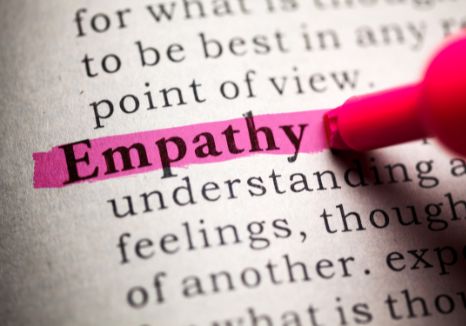Leadership is About Empathy
Tuesday, 07 June 2022
Leadership is about empathy. Leaders need to be able to understand and imagine what other people are feeling in order to lead them effectively. They also need to be able to put themselves in other people's shoes in order to empathize with them and find common ground. This means that leaders must be patient and understanding, even when dealing with difficult or challenging situations.
Leaders need to be able to understand and imagine what other people are feeling in order to lead them effectively. They also need to be able to put themselves in other people's shoes in order to empathize with them and find common ground. I do not believe that leaders can be empathic without being able to put themselves in other people's shoes.
The power of empathy in leadership: connecting with people
Most people would agree that empathy is one of the most important qualities a leader can have, especially this time following a pandemic period for the past 2,5 years with all its uncertainties and hardships. Leaders need to be able to understand and empathize with their followers in order to build trust and create a cohesive team.
But what is empathy, exactly? Empathy is the ability to feel what another person feels, or understand their experience from within. It’s not just about being able to share someone else’s emotions; it’s about being aware of them as unique individuals and taking into account their feelings, beliefs, and perspective.
Listening with empathy: understanding others
Empathy is the ability to understand and share the feelings of another person. This skill is essential for leaders, as it allows them to connect with their followers and motivate them to achieve common goals. Leaders who are skilled in empathy are better able to create an environment that is conducive to success.
They are also better equipped to solve problems and address grievances effectively. Empathy is not just the ability to put yourself in someone else's shoes. It s the ability to perceive others as more than just their body, their possessions, or their status. It s about identifying with another person's thoughts and feelings.
Responding with empathy: showing care
Leaders need to be able to put themselves in other people’s shoes and understand their needs and concerns. This can be difficult, but it is essential for effective leadership. Leaders need to be able to connect with others on an emotional level in order to build trust and partnerships. They need to treat others with dignity and respect their ideas and needs, even if they are different from them.
Leaders need to be able to understand the needs of their team and communicate those needs clearly. This can be difficult, but it is essential for effective leadership. Leaders must also show empathy for others in order to develop relationships that are supportive, caring, and trustful.
In addition, leaders must be able to work collaboratively with others. In order for leaders to be successful, they must build or maintain healthy relationships with others.
But how can you develop this skill? Here are a few tips:
1. Pay attention to your own emotions. One of the best ways to develop empathy is to become aware of your own emotions and how they influence your interactions with others. When you know what you’re feeling, it’s easier to understand why someone else might be feeling a certain way.
2. Put yourself in other people’s shoes. Another way to develop empathy is by trying to see things from other people’s perspectives. Many people go through life without really considering how their actions or words might affect others. They only think about themselves and what makes them happy or fulfilled. However, there are people who take the time to think about others and put themselves in their shoes. They may go out of their way to help someone or to be kind, even if it's not easy or convenient for them.
Empathic leaders also tend to be more aware of factors that affect employee performance, including obstacles related to motivation, morale, work environment, personal problems, health concerns, stress management, workloads, job duties, work-life balance, and career development.
As a result, empathic leaders are often better at managing difficult employee situations without negatively affecting productivity or engagement levels in their teams.
Conclusion: The importance of empathy in leadership
Leadership is about empathy. Leaders must be able to put themselves in others' shoes and understand their motivations and feelings. They need to be able to connect with people on a personal level, so they can inspire them and lead them through difficult times. Leaders also need to be good communicators, so they can effectively convey their ideas and goals to other people.
Empathy is an essential component of leadership. By understanding and considering the feelings and perspectives of others, leaders can create a more positive and productive work environment. Leaders who lack empathy can damage relationships with employees and clients, which can lead to decreased productivity and negative publicity.
Therefore, it is important for leaders to develop their empathy skills in order to be effective and successful.


